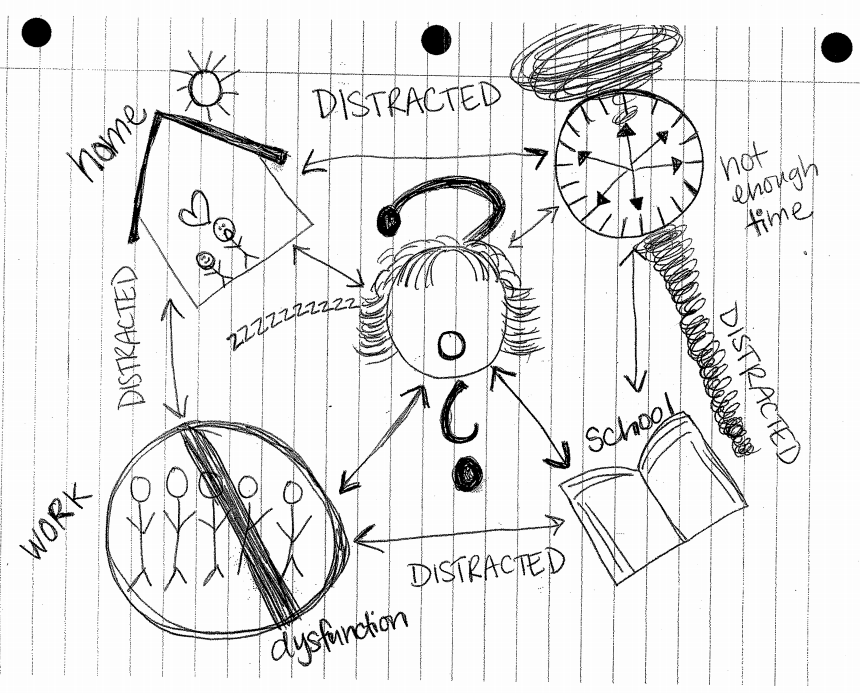by Monica Fochtman

I drew this picture of myself in spring 2007 when I was a full-time doctoral student. It was part of an assignment for our qualitative research methods class. I remember being excited to draw this picture because I thought that my fellow graduate students’ self-portraits would look similar, and I looked forward to kvetching about grad school life when we shared them in our small groups. At the time, my other roles included: mother, wife, part-time graduate assistant, and daughter and sister to a far-away family that was in crisis. These roles were obviously weighing heavily on me and my psyche. Clearly the person in this photo was not well. I was not well.
What shocked me was that other students in class did not have drawings that looked like mine. Sure, doctoral life is hard, and we were all dealing with the pressures of work, assistantships, families and too much reading. So much reading. But the other drawings looked…”normal.” No one else had question marks or the words “distracted” written all over their page. My friends were stressed, but they were not in distress.
Looking at this self-portrait spurred me on to seek help.Thankfully, I had gone to therapy once before so I knew how it benefited me and subsequently, my other relationships. Having an objective person to talk to was very helpful for me. It was a safe place where I could talk freely without judgment about my perceived failures as a mother and PhD student. Therapy helped me hit the reset button and gave me tangible coping skills that I needed to manage my runaway thoughts and feelings.
Therapy worked for me. I would go for a few months, get “better,” and then stop going. This was ok at first. But these feelings of being overwhelmed and paralyzed would always creep back in. Always. After my son was diagnosed with cancer, they kicked in full force, and I got myself back in to see someone. Luckily, the person I found had specialized training helping families deal with illness and loss. She let me cry. She let me get really, really angry. And most important, she gave me a name for this darkness that always seemed to find me. I remember sitting in her office one day, and I said, “Why do I keep ending up in this place? I always need to come back here.” She was the first person in my life to tell me that “this darkness” is called anxiety and depression. And it’s not my fault.
When I finally had a name for what I was experiencing, I felt…relieved. Sweet, sweet relief. The truth is, I have felt this way for most of my life. Looking back on my late 20s and early 30s, I can now see patterns of behavior. Periods of incredible activity and productivity, followed or preceded by valleys of exhaustion and inactivity. I thought that this is how everyone felt. I thought this is what it meant to be east-coast, high-achieving and high-strung. And what was necessary to cope as such.
Since my diagnosis, I have done a lot of research about anxiety and depression.The biggest lesson I have learned that I hope to share with others is that depression is not logical. It’s chemicals. My brain is wired differently. I need to deal with my chemicals differently. And I need to give myself permission to negotiate life on my terms.
I can shave my head – twice – and raise money for childhood cancer research, but the mere thought of training for another 5K sends me into a tailspin. I tried sleeping in my workout clothes to inspire myself to exercise in the morning, and I ended up having a panic attack. Not logical. It doesn’t make sense. It just is. I can stand alone on stage and read from the very bottom of my heart about our family’s journey with cancer, but it took me two weeks to write this blog post, and technically, I submitted it a day late. Traffic makes me nervous, but I can drive twelve hours to New Jersey if I know that my niece’s first birthday party is waiting on the other side. See? Not logical in any way.
In a way, I am proud of these things. Do I wish that I didn’t wrestle with anxiety and depression? Of course. But that is not an option for me. I was depressed. I have depression. I will always deal with it. It is what it is, and I am who I am. Giving it a name and arming myself with tools to face it head on have made all the difference for me.
Thanks for listening.
Originally posted at the Student Affairs Collective on May 27, 2014.
